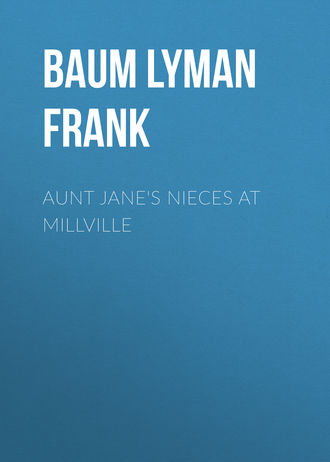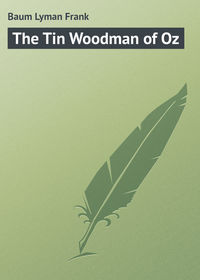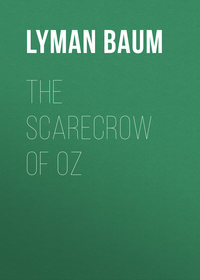 полная версия
полная версияAunt Jane's Nieces at Millville
"Well, I declare!" said the little man, merrily; "didn't I warn you, Louise, not to try to saddle a murder onto my new farm? How you foolish girls could ever have imagined such a carnival of crime in connection with the Weggs is certainly remarkable."
"I don't know about that, sir," returned the Major, seriously. "I was meself inoculated with the idea, and for a while I considered meself and the girls the equals of all the Pinkertons in the country. And when ye come to think of it, the history of poor Captain Wegg and his wife, and of Nora and Thomas as well, is out of the ordinary entirely, and, without the explanation, contained all the elements of a first-class mystery."
"How did you say the Weggs lost their money?" inquired Uncle John, turning the subject because he saw that it embarrassed his nieces.
"Why, forest fires at Almaquo, in Canada, burned down the timber they had bought," replied the Major. "And, by the way, John, you're interested in that matter yourself, for the Pierce-Lane Lumber Company, in which you own a lot of stock, had contracted to cut the timber on a royalty."
"How long ago?"
"Three years, sir."
"Well, we've been cutting timber at Almaquo ever since," said Mr.
Merrick.
Louise dropped her fork with a clatter, disclosing, in this well-bred young lady, an unusual degree of excitement.
"Then there is something to detect!" she cried.
"Eh? What do you mean?" inquired her uncle.
"If you've been cutting timber at Almaquo for three years, the trees couldn't have burned down," Louise declared, triumphantly.
"That is evident," said the Major, dryly. "I've had it in me mind, Louise, to take that matter up for investigation; but you are so imbued with the detective spirit that there's no heading you off a trail."
"Before the dessert comes on," announced Uncle John, impressively, "I want to make a statement. You folks have tried your hands at the detective business and made a mess of it. Now it's my turn. I'll be a detective for three days, and if I don't succeed better than you did, young women, we'll mingle our tears in all humility. Eh, Major?"
"Put me in the bunch, sir," said the old soldier, "I was as bad as any of them. And go ahead in your own way, if ye like. It's me humble opinion, John, that you're no Sherlock Holmes; but ye won't believe it 'til ye satisfy yourself of the fact."
Next morning the loungers around Sam Cotting's store were thrown into a state of great excitement when "the nabob" came over from the Wegg farm and held the long-distance telephone for more than an hour, while he talked with people in New York. The natives knew that their telephone, which was built into a small booth at one end of the store – next the post-office boxes – was part of a system that made it possible for one to talk to those in far away cities. Often the country people would eye the mysterious-looking instrument with awe and whisper to each other of its mighty powers; but no one had ever before used it to telephone farther than the Junction, and then only on rare occasions.
"It'll cost a heap o' money, Sam," said McNutt, uneasily, while Uncle John was engaged in his remarkable conversation. They could see him in the booth, through the little window.
"It will, Mac," was the solemn reply. "But the fool nabob may as well spend it thet way as any other. It's mighty little of his capital er surplus gits inter my cash-drawer; 'n' thet's a fact."
Uncle John came from the booth, perspiring, but smiling and happy. He walked across the street to see Joe Wegg, and found the youth seated in a rocking-chair and looking quite convalescent. But he had company. In a chair opposite sat a man neatly dressed, with a thin, intelligent face, a stubby gray moustache, and shrewd eyes covered by horn-rimmed spectacles.
"Good morning, Mr. Merrick," said Joe, cheerily; "this is Mr. Robert West, one of the Millville merchants, who is an old friend of our family."
"I've heard of Mr. West, and I'm glad to meet him," replied Uncle John, looking at the other calmly, but not offering to shake hands. "I believe you are the president and treasurer of the Almaquo Timber Tract Company, are you not?"
Joseph looked startled, and then embarrassed, as he overheard the question. West, without altering his position of careless ease, glanced over the rims of his glasses at the speaker.
"I am the humble individual you refer to, Mr. Merrick," he said, briefly.
"But the Almaquo timber all burned down." remarked Joe, thinking an explanation was needed.
"That's a mistake," returned Mr. Merrick. "My company has paid Mr. West, as treasurer of his company, more than fifty thousand dollars during the last three years."
West's jaw dropped.
"Your company!" he exclaimed, as if mystified.
"Yes; I own the controlling interest in the Pierce-Lane Lumber Company, which has the contract to cut your timber," answered Mr. Merrick.
The hardware dealer slowly arose and glanced at his watch.
"I must get back to my store," he said. "You are somewhat in error about your company, Mr. Merrick; but I suppose your interests are so large and varied that you cannot well keep track of them. Good morning, sir. I'll see you again soon, Joe. Glad you're improving so rapidly. Let me know if I can do anything to help you."
With these quiet words, he bowed and left the room, and when he had gone, Joe said, in a deprecating tone:
"Poor Bob must be very unhappy about having lost my father's money in that speculation, for he advocated the plan very strongly, believing it was a good investment. I'm afraid your mistake about paying him all that money upset him. Don't mind if he was a little brusque, sir. Bob West is a simple, kindly man, whom my father fully trusted. It was he that loaned me the money to get away from here with."
"Tell me," said Uncle John, thoughtfully, "did your father receive stock in the Almaquo Timber Tract Company in exchange for his money?"
"Oh, yes; I have seen it in the steel cupboard," replied Joe.
"Where is that?"
"Why, it is the cupboard in the right wing of our house, which was the Captain's own room. It was one of his whims, when he built, to provide what he called his 'bank.' You may have noticed the wooden doors of a cupboard built into the stone wall, sir?"
"Yes; I occupy the room."
"Behind the wooden doors are others of steel. The entire cupboard is steel-lined. Near the bottom is a sliding-plate, which, when pushed aside, discovers a hidden drawer – a secret my father never confided to anyone but me. He once told me that if his heart trouble earned him off suddenly I ought to know of the existence of this drawer; so he showed me how to find it. On the day after his death I took the keys, which he always carried on a small chain around his neck and concealed underneath his clothing, and opened the cupboard to see if I could find anything of value. It is needless to say, I could not discover anything that could be converted into a dollar. The Captain had filled the cupboard with old letters and papers of no value, and with relics he had brought from foreign lands during his many voyages. These last are mere rubbish, but I suppose he loved them for their association. In the secret drawer I found his stock in the timber company, and also that of old Will Thompson, who had doubtless left it with my father for safekeeping. Knowing it was now worthless, I left it in the drawer."
"I'd like to see it," announced Uncle John.
Joe laughed.
"I've lost the keys," he said.
"How's that, my lad?"
"Why, on the day of the funeral the keys disappeared. I could never imagine what became of them. But I did not care to look in the cupboard a second time, so the loss did not matter."
Mr. Merrick seemed thoughtful.
"I suppose I own that cupboard now," he remarked.
"Of course," said Joe. "But without the keys it is not serviceable. If you drill through the steel doors you destroy their security."
"True; but I may decide to do that."
"If you do, sir, I'd like you to clear out the rubbish and papers and send them to me. They are family matters, and I did not intend to sell them with the place."
"You shall have them, Joe."
"Just underneath the left end of the lower shelf you will find the sliding steel plate. It slides toward the front. In the drawer you will find the worthless stock and a picture of my mother. I'd like to keep the picture."
"You shall, Joseph. How are you getting on?"
"Why, I'm a new man, Mr. Merrick, and today I'm feeling as strong as a buffalo – thanks to your kind guardianship."
"Don't overdo, sir. Take it easy. There's a young lady coming to see you today."
"Ethel!" the boy exclaimed, his face turning crimson.
"Yes," returned Uncle John, tersely. "You've treated that girl shamefully, Joseph Wegg. Try to make proper amends."
"I never could understand," said Joe, slowly, "why Ethel refused to answer the letter I wrote her when I went away. It explained everything, yet – "
"I'll bet the farm against your lame shoulder she never got your letter," declared Uncle John. "She thought you left her without a word."
"I gave it to McNutt to deliver after I was gone. But you say she's coming today?"
"That is her intention, sir."
Joe said nothing more, but his expressive face was smiling and eager. Uncle John pressed the boy's hand and left him, promising to call again soon.
"Now, then," muttered the little millionaire, as he walked down the street, "to beard the lion in his den."
The den proved to be the hardware store, and the lion none other than Robert West. Mr. Merrick found the merchant seated at his desk in the otherwise deserted store, and, with a nod, helped himself to the only other chair the little office contained.
"Sir," said he, "I am here to demand an explanation."
"Of what?" asked West, coldly.
"Of your action in the matter of the Almaquo Timber Tract Company. I believe that you falsely asserted to Captain Wegg and Mr. Thompson that the timber had burned and their investment was therefore worthless. The news of the disaster killed one of your confiding friends and drove the other mad; but that was a consequence that I am sure you did not intend when you planned the fraud. The most serious thing I can accuse you of is holding the earnings of the Wegg and Thompson stock – and big earnings they are, too – for your own benefit, and defrauding the heirs of your associates of their money."
West carefully balanced a penholder across his fingers, and eyed it with close attention.
"You are a queer man, Mr. Merrick," he said, quietly. "I can only excuse your insults on the grounds of ignorance, or the fact that you have been misinformed. Here is the newspaper report of the Almaquo fire, which I showed my friends the night of Captain Wegg's sudden death." He took a clipping from a drawer of the desk and handed it to Uncle John, who read it carefully.
"As a matter of fact," continued West, "you are not cutting that portion of the Almaquo tract which this fire refers to, and which Thompson and Wegg were interested in, but the north half of the tract, which they had never acquired any title to."
"I suppose the stock will show that," suggested Mr. Merrick.
"Of course, sir."
"I will look it up."
West smiled.
"You will have some trouble doing that," he said.
"Why?"
"Wegg and Thompson had transferred their entire stock to me before one died and the other went mad," was the quiet reply.
"Oh, I see." The lie was so evident that Uncle John did not try to refute it.
"I am rather busy, Mr. Merrick. Anything more, sir?"
"Not today. Bye and bye, Mr. West."
He marched out again and climbed into his buggy to drive home. The interview with Bob West had made him uneasy, for the merchant's cold, crafty nature rendered him an opponent who would stick at nothing to protect his ill-gotten gains. Uncle John had thought it an easy matter to force him to disgorge, but West was the one inhabitant of Millville who had no simplicity in his character. He was as thoroughly imbued with worldly subtlety and cunning as if he had lived amid the grille of a city all his life; and Mr. Merrick was by no means sure of his own ability to unmask the man and force him to make restitution.
CHAPTER XIX.
THE COURT'N OF SKIM CLARK
By this time the summer was well advanced, and the rich people at the Wegg farm had ceased to be objects of wonder to the Millville folk. The girls were still regarded with curious looks when they wandered into the village on an errand, and Mr. Merrick and Major Doyle inspired a certain amount of awe; but time had dulled the edge of marvelous invasion and the city people were now accepted as a matter of course.
Peggy McNutt was still bothering his head over schemes to fleece the strangers, in blissful ignorance of the fact that one of his neighbors was planning to get ahead of him.
The Widow Clark was a shrewd woman. She had proven this by becoming one of the merchants of Millville after her husband's death. The poor man had left an insurance of five hundred dollars and the little frame building wherein he had conducted a harness shop. Mrs. Clark couldn't make and repair harness; so she cleared the straps and scraps and wax-ends out of the place, painted the interior of the shop bright yellow, with a blue ceiling, erected some shelves and a counter and turned part of the insurance money into candy, cigars, stationery, and a meager stock of paper-covered novels.
Skim, her small son, helped her as far as he was able, and between them they managed things so frugally that at the end of eight years the widow still had her five hundred dollars capital, and the little store had paid her living expenses.
Skim was named after his uncle, Peter Skimbley, who owned a farm near Watertown. The widow's hopeful was now a lank, pale-faced youth of eighteen, whose most imposing features were his big hands and a long nose that ended in a sharp point. The shop had ruined him for manual labor, for he sat hunched up by the stove in winter, and in summer hung around Cotting's store and listened to the gossip of the loungers. He was a boy of small conversational powers, but his mother declared that Skim "done a heap o' thinkin' that nobody suspected."
The widow was a good gossip herself, and knew all the happenings in the little town. She had a habit of reading all her stock of paper-covered novels before she sold them, and her mind was stocked with the mass of romance and adventure she had thus absorbed. "What I loves more'n eat'n' or sleep'n'," she often said, "is a rattlin' good love story. There don't seem to be much love in real life, so a poor lone crittur like me has to calm her hankerin's by a-readin' novels."
No one had been more interested in the advent of the millionaire at the Wegg farm than the widow Clark. She had helped "fix up" the house for the new owner and her appreciative soul had been duly impressed by the display of wealth demonstrated by the fine furniture sent down from the city. She had watched the arrival of the party and noticed with eager eyes the group of three pretty and stylishly dressed nieces who accompanied their rich uncle. Once or twice since the young ladies had entered her establishment to purchase pens or stationery, and on such occasions the widow was quite overcome by their condescension.
All this set her thinking to some purpose. One day she walked over to the farm and made her way quietly to the back door. By good fortune she found blind Nora hemming napkins and in a mood to converse. Nora was an especially neat seamstress, but required some one to thread her needles. Mary the cook had been doing this, but now Mrs. Clark sat down beside Nora to "hev a little talk" and keep the needles supplied with thread.
She learned a good deal about the nieces, for old Nora could not praise them enough. They were always sweet and kind to her and she loved to talk about them. They were all rich, too, or would be; for their uncle had no children of his own and could leave several millions to each one when he died.
"An' they're so simple, too," said the old woman; "nothin' cityfied ner stuck-up about any on 'em, I kin tell ye. They dresses as fine as the Queen o' Sheba, Tom says; but they romp 'round just like they was borned in the country. Miss Patsy she's learnin' to milk the cow, an' Miss Beth takes care o' the chickens all by herself. They're reg'lar girls, Marthy Clark, an' money hain't spiled 'em a bit."
This report tended to waken a great ambition in the widow's heart. Or perhaps the ambition had already taken form and this gossip confirmed and established it. Before she left the farm she had a chance to secretly observe the girls, and they met with her full approval.
At supper that evening she said to her hopeful:
"Skim, I want ye to go courtin'."
Skim looked up in amazement.
"Me, ma?" he asked.
"Yes, you. It's time you was thinkin' of gittin' married."
Skim held his knife in his mouth a moment while he thought over this startling proposition. Then he removed the cutlery, heaved a deep sigh, and enquired:
"Who at, ma?"
"What's that?"
"Who'll I go courtin' at?"
"Skim, you 'member in thet las' book we read, 'The Angel Maniac's
Revenge,' there was a sayin' that fate knocks wunst on ev'ry man's door.
Well, fate's knockin' on your door."
Skim listened, with a nervous glance toward the doorway. Then he shook his head.
"All fool fancy, ma," he remarked. "Don't ye go an' git no rumantic notions out'n books inter yer head."
"Skim, am I a fool, er ain't I?"
"'Tain't fer me ter say, ma."
"Fate's knockin', an' if you don't open to it, Skim, I'll wash my hands o' ye, an' ye kin jest starve to death."
The boy looked disturbed.
"What's aggrivatin' of ye, then?" he enquired, anxiously.
"A millionaire is come right under yer nose. He's here in Millville, with three gals fer nieces thet's all got money to squander an's bound to hev more."
Skim gave a low whistle.
"Ye don't mean fer me to be courtin' at them gals, do ye?" he demanded.
"Why not? Yer fambly's jest as respectible as any, 'cept thet yer Uncle Mell backslided after the last revival, an' went to a hoss race. Yer young, an' yer han'some; an' there's three gals waitin' ready to be won by a bold wooer. Be bold, Skim; take fate by the fetlock, an' yer fortun's made easy!"
Skim did not reply at once. He gulped down his tea and stared at the opposite wall in deep thought. It wasn't such a "tarnal bad notion," after all, and so thoroughly impressed was he with his own importance and merit that it never occurred to him he would meet with any difficulties if he chose to undertake the conquest.
"Peggy says marri'ge is the mark of a fool; an' Peggy married money, too," he remarked slowly.
"Pah! money! Mary Ann Cotting didn't hev but a hundred an' forty dollars, all told, an' she were an old maid an' soured an' squint-eyed when Peggy hitched up with her."
"I hain't seen nuthin' o' the world, yit," continued Skim, evasively.
"Ner ye won't nuther, onless ye marry money. Any one o' them gals could take ye to Europe an' back a dozen times."
Skim reflected still farther.
"Courtin' ought to hev some decent clothes," he said. "I kain't set in the nabob's parlor, with all thet slick furnitur', in Nick Thorne's cast-off Sunday suit."
"The cloth's as good as ever was made, an' I cut 'em down myself, an' stitched 'em all over."
"They don't look like store clothes, though," objected Skim.
The widow sighed.
"Tain't the coat that makes the man, Skim."
"It's the coat thet makes decent courtin', though," he maintained, stubbornly. "Gals like to see a feller dressed up. It shows he means business an' 'mounts to somethin'."
"I give Nick Thorne two dollars an' a packidge o' terbacker fer them clotlies, which the on'y thing wrong about was they'd got too snug fer comfert. Nick said so himself. But I'll make a bargain with ye, Skim. Ef you'll agree to give me fifty dollars after yer married, I'll buy ye some store clothes o' Sam Cotting, to do courtin' in."
"Fifty dollars!"
"Well, I've brung ye up, hain't I?" "I've worked like a nigger, mindin' shop." "Say forty dollars. I ain't small, an' ef ye git one o' them city gals, Skim, forty dollars won't mean no more'n a wink of an eye to ye."
Skim frowned. Then he smiled, and the smile disclosed a front tooth missing.
"I'll dream on't," he said. "Let ye know in the mornin', ma. But I won't court a minite, mind ye, 'nless I git store clothes."
CHAPTER XX.
A LOST CAUSE
The boy's musings confirmed him in the idea that his mother's scheme was entirely practical. He didn't hanker much to marry, being young and fairly satisfied with his present lot; but opportunities like this did not often occur, and it seemed his bounden duty to take advantage of it.
He got the "store clothes" next day, together with a scarlet necktie that was "all made up in the latest style," as Sam Cotting assured him, and a pair of yellow kid gloves "fit fer a howlin' swell." Skim wasn't sure, at first, about the gloves, but capitulated when Sam declared they were "real cityfied."
In the evening he "togged up," with his mother's help, and then walked over to the Wegg farm.
Beth answered the knock at the door. The living room was brightly lighted; Uncle John and the Major were playing checkers in a corner and Patsy was softly drumming on the piano. Louise had a book and Beth had been engaged upon some fancy-work.
When the door opened Skim bobbed his head and said:
"Evenin', mom. I've come a-visitin'."
Beth conquered an inclination to smile.
"Won't you come in?" she said, sweetly.
"Thankee; I will. I'm Skimbley Clark, ye know; down t' the village. Ma keeps a store there."
"I'm pleased to meet you, Mr. Clark. Allow me to introduce to you my uncle and cousins," said the girl, her eyes dancing with amusement.
Skim acknowledged the introductions with intense gravity, and then sat down upon a straight-backed chair near the piano, this being the end of the room where the three girls were grouped. Uncle John gave a chuckle and resumed his game with the Major, who whispered that he would give a dollar for an oil painting of Mr. Clark – if it couldn't be had for less.
Louise laid down her book and regarded the visitor wonderingly. Patsy scented fun and drew a chair nearer the group. Beth resumed her embroidery with a demure smile that made Skim decide at once that "he picked the pretty one."
Indeed, the decision did justice to his discretion. Beth De Graf was a rarely beautiful girl and quite outshone her cousins in this respect. Louise might be attractive and Patsy fascinating; but Beth was the real beauty of the trio, and the most charming trait in her character was her unconsciousness that she excelled in good looks.
So Skim stared hard at Beth, and answered the preliminary remarks addressed to him by Patsy and Louise in a perfunctory manner.
"Won't you take off your gloves?" asked Louise, soberly. "It's so warm this evening, you know."
The boy looked at his hands.
"It's sech a tarnal job to git 'em on agin," he replied.
"Don't put them on, then," advised Patsy. "Here in the country we are allowed to dispense with much unnecessary social etiquette."
"Air ye? Then off they come. I ain't much stuck on gloves, myself; but ma she 'lowed that a feller goin' courtin' orter look like a sport."
A chorus of wild laughter, which greeted this speech, had the effect of making Skim stare at the girls indignantly. He couldn't find anything funny in his remark; but there they sat facing him and uttering hysterical peals of merriment, until the tears ran down their cheeks.
Silently and with caution he removed the yellow gloves from his hands, and so gave the foolish creatures a chance "to laugh out their blamed giggle."
But they were watching him, and saw that he was disconcerted. They had no mind to ruin the enjoyment in store for them by offending their guest, so they soon resumed a fitting gravity and began to assist the youth to forget their rudeness.
"May I ask," said Patsy, very graciously, "which one of us you intend to favor with your attentions?"
"I ain't much used to sech things," he replied, looking down at his big hands and growing a little red-faced. "P'raps I hadn't orter tell, before the rest o' ye."









